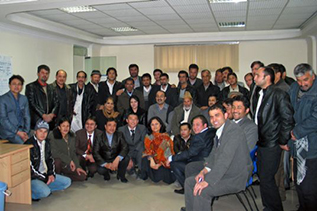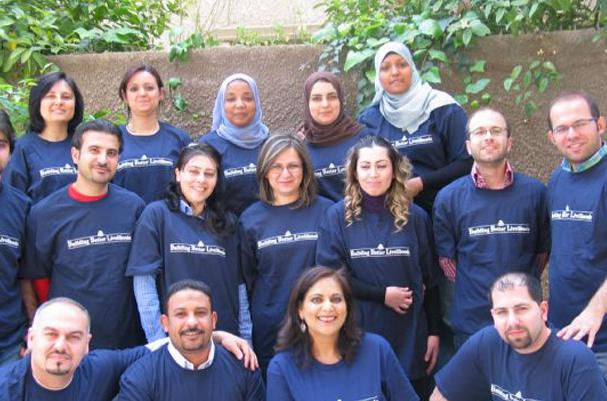“Our duty is to try to free people from poverty. And to me, poverty means being without shelter, without protection, without access to healthcare, education, or credit, and without hope of ever controlling one’s own destiny.” — Mawlana Hazar Imam
What is a sustainable livelihood and how does the Aga Khan Development Network tackle the faces of poverty, ill health, lack of education, lack of opportunity, and the ravages of war and the ideas that keep people from hoping for a better future?
The Golden Jubilee of Mawlana Hazar Imam has changed lives across the worldwide Jamat — including my own. I have spent the last year wrestling to understand the complex problem of poverty and how difficult it is to help people to build a sustainable livelihood. A small microenterprise, a stall selling vegetables, a sewing machine, a buffalo, a goat, a better roof or some insurance for a rainy day; all of these are simple things that can give people hope that their children will be shielded from the many faces of poverty.
One tool that can help alleviate poverty is microfinance — financial services that cater to the special needs of poor people. The employees who reach out to deliver these services are hard working and determined agents of change. They empower people in need and help them to believe that they can change their future.
The Aga Khan Agency for Microfinance (AKAM) has over 3 500 such employees in 13 countries. AKAM delivers loans for businesses, savings programmes, insurance for health and life, agricultural loans, housing loans, education finance and other services that give people a chance to build a livelihood.

With the objective of expanding the capacity of its employees to alleviate poverty, the AKAM management team commissioned a concept paper in June 2008. I was blessed with the privilege of serving my Time and Knowledge Nazrana (TKN) by conducting research to discover how best to inspire, motivate and train AKAM’s employees so that they could work as high performing teams with a common vision and culture of innovation and excellence.
AKAM’s employees reach out to some of the poorest and most isolated populations on the planet. They face unique challenges in each country, culture and environment. From Afghanistan’s war ravaged regions, to Tajikistan’s high mountain populations, to the walls of Al-Azhar Park and the bustling markets of Africa, AKAM loan officers, branch staff, support and management teams all try to bring the possibility of sustainable livelihoods to people who do not have access to financial services.
A loan officer has to help a client analyse a business idea, ask the right questions, build a business plan and often provide advice to ensure success. Even before beginning, the officer may have to mobilise an entire community and deal with the complexities of its social fabric. AKAM realises that productivity is not only gained through better skills, but also in fostering a culture of innovation, teamwork and quality. All of this work is conducted within the framework of AKDN’s development ethics; principles that inspire not just the work itself, but also how people are treated, trusted, and how their dignity is protected. These were the issues I had to understand before I could begin.
I began by conducting a dialogue across 13 countries to find out what was really happening on the ground and what critical problems and challenges people faced while working in the field with clients. This part of my assignment was remote; I was able to use technology to communicate with everyone online.
At the same time, I researched training models. Academies are usually institutions in buildings with classrooms where students can learn. But it was immediately obvious that if AKAM built a physical academy, it would only benefit a few — there were not enough resources for every employee to go to a single place to learn. Also, growing rapidly at over 80 per cent a year, AKAM did not have the time to wait for a physical space.
Thus, the initial vision of the academy was a “virtual entity”, one that existed in the field in all the countries at once and found an innovative way to bring new knowledge and skills right to the employee. More importantly, trainers and training sessions would also be local so that the academy would be a virtual endeavour that lived in every country with its trainers and learners.
A concept paper was presented to the Management and Board of AKAM within three months and I thought my TKN project was over. But I was asked to present the project to the leadership of AKAM, and, after intense grilling, discussion and rework, a small pilot test in Afghanistan was approved. I knew that I had to see this concept tested myself, so I signed up for Phase II.
I now had a whole new challenge. How do you engage such a diverse group worldwide with ideas of AKDN’s development philosophy, AKAM’s ethics of how to work with vulnerable people, best practices in microfinance and build a common culture that inspires and brings them together as one global team? How do you tap into the experience of 3,500 people around the globe and move AKAM itself to the next level of excellence? The solution was to create a fresh conversation, a journey, a set of experiences that engaged people with active shared learning and began the process of opening new doors to skills, knowledge and teamwork.
Development Ethics 100 is this journey. It is a five day course about the shared purpose and vision of AKAM and provides a practical and hands-on experience of new ideas and best practices in microfinance. The course development philosophy did not focus on presenting information but changing behaviour in people by telling stories, sharing experiences connecting with the local culture and real problems.
The course empowers the learner, rather than the trainer, to take charge. This means no lecturing, no endless PowerPoint presentations filled with ideas; but active shared learning and doing. The pilot worked; the training was successful and even experienced loan officers felt they learned from each other. They were excited about using these new ideas and knowledge in their work.
The AKAM Training Academy is now a formal project of AKAM. In the first six months of 2009 the Academy has delivered the Development Ethics course in Syria, Tajikistan, Egypt, West Africa and Madagascar. The Academy has also started building local capacity with regional trainer workshops resulting in 20 new certified trainers, ready to take this experience to all their employees. By the end of its first year all 13 countries will have delivered this critical learning opportunity to every single employee. TKN is a key factor, translation and course development of the next course, Loan Officer 100, is being done by other TKN volunteers across the world. A full programme leading to a certificate in Microfinance is now being planned along with an online knowledge base for self improvement courses.
AKAM is investing in it employees worldwide and my TKN experience has not been a one-way skills transfer; AKAM has also invested in me. I have built my knowledge of microfinance, of capacity building with respect for communities and people, and above all, an urgency to do more for the people of the developing world. In the end, it was the people I worked with who were so keen to learn and access knowledge that made my work successful. This year of living to build better livelihoods has had an impact on AKAM, on its global team, and on me; all through the resources made available by Mawlana Hazar Imam through the Time and Knowledge Nazrana.
Shaheen Tejani is a Project Manager at the Aga Khan Agency for Microfinance Training Academy.


 Fifteen trainers from Egypt and Syria learnt how to conduct high impact training in Damascus. Photo: Courtesy of Shaheen Tejani.
Fifteen trainers from Egypt and Syria learnt how to conduct high impact training in Damascus. Photo: Courtesy of Shaheen Tejani. With the objective of expanding the capacity of its employees to alleviate poverty, the AKAM management team commissioned a concept paper in June 2008. I was blessed with the privilege of serving my Time and Knowledge Nazrana (TKN) by conducting research to discover how best to inspire, motivate and train AKAM’s employees so that they could work as high performing teams with a common vision and culture of innovation and excellence.
With the objective of expanding the capacity of its employees to alleviate poverty, the AKAM management team commissioned a concept paper in June 2008. I was blessed with the privilege of serving my Time and Knowledge Nazrana (TKN) by conducting research to discover how best to inspire, motivate and train AKAM’s employees so that they could work as high performing teams with a common vision and culture of innovation and excellence.